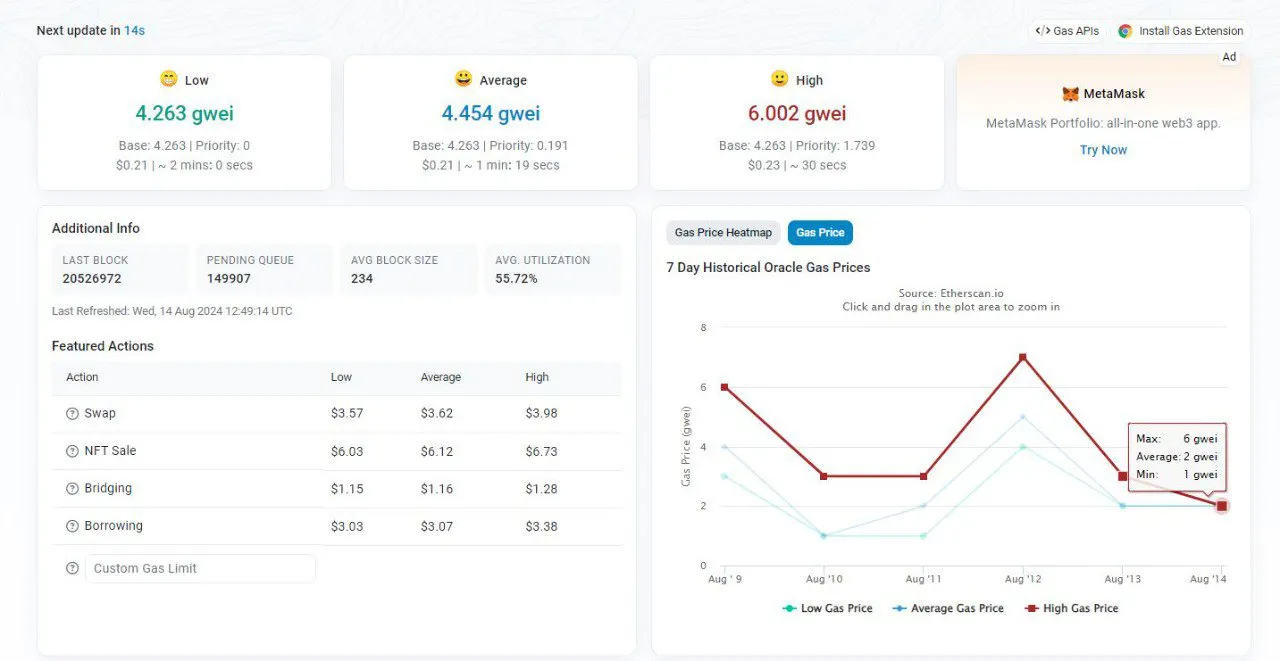Low prices caused Ethereum gas fees to fall to single digits in the past few days. Etherscan, Ethereum’s blockchain explorer, indicates that users paid as little as 1 gwei to send ETH. These numbers have not been seen since 2020, and analysts predict they will not remain this low for long.
Ethereum gas fees fell to lows not witnessed since 2020. Data from blockchain explorer Etherscan revealed that users paid 1 gwei, or 0.007, to send ETH on August 10th, the lowest gas fee on record in about four years.
On August 11th, Etherscan recorded that the gas fees doubled to 2 gwei. Ethereum underwent the Berlin hard fork in 2021, and since then, gas fees have not fallen below 10 gwei in more than 20 days.
Ethereum’s L2s record increased activities

Lead researcher at CoinMarketCap, Alice Liu, mentioned that gas fees on the Ethereum mainnet go below the average when ETH retails at lower than market price levels and displays reduced network activity.
“This often occurs during periods where Ethereum is suffering from lower-than-market price levels and is generally seen as a reflection of lower network activity and market sentiments.”
-Alice Liu
Liu also mentioned that Ethereum gas fees tend to surge during business hours in the United States and tend to reduce late at night and on weekends when activity reduces. She warned that the low gas fees will not last.
Some experts believe Ethereum’s reduced gas fees result from activity migration from the mainnet to layer 2 scaling solutions.
Data from L2Beat, an on-chain tracker, indicates that total value locked on layer 2 scaling solutions surged 300% in less than a year, from $12 billion at a time like this last year to $37 billion. Arbitrum One currently leads the pack with a total value locked (TVL) of $15.32 billion. The layer two scaling solution commands a market share of 40.90%.
Coinbase’s layer 2 scaling solution Base ranks below Arbitrum One, with its TVL settling at $6.38 billion. Base commands a 17.03% market share despite being less than a year old. The L2’s performance since launch depicts the growing pace of the Ethereum scaling ecosystem.
ETH burning rate reduces significantly with falling gas fees
Notably, Ethereum is an inflationary network, and lower gas fees mean that the burning rate of ETH will be reduced considerably. Data from ultrasound.money indicates that the burn rate for ETH currently stands at 0.16 ETH/min.
The data also revealed that 225 ETH have been burned in the past 24 hours, while 2,357 new ETH have been introduced to the network. The reduced burning rate, therefore, triggers an increased ETH supply.
According to CoinMarketCap, Ethereum retails at $2,727 and has a circulating supply of 120,274,778 ETH at the time of this publication. ETH prices have not met investors’ expectations following recent spot ETF approvals from the United States Securities and Exchange Commission (SEC).




